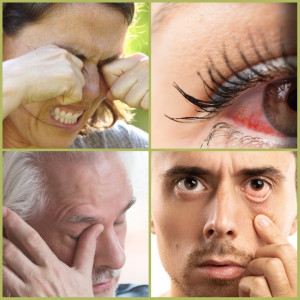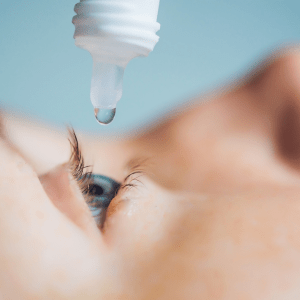It is a multifactorial disease affecting the production or normal functioning of tears. Tears are important to moisten, protect and cleanse our eyes, therefore their dysfunction can make eyes susceptible to infections.
There are mainly two types of dry eye disease,
1. Evaporative due to poor quality of tear film
2. Secretary due to poor secretion of tears.
What are the symptoms of dry eyes?
As the outer moist layer of the eye is compromised there is a constant feeling of grittiness and discomfort. Symptoms of dry eyes are usually
- Foreign body sensation
- Burning
- Increased blinking
- Watering ( reflex action)
- The feeling of tiredness in the eyes
- Redness
dry eye? but why?
The tear film that covers the outer layer of the eyes has 3 layers.
1. The outermost layer is the oily or lipid layer secreted by the oil glands present on the eyelids.
2. The middle aqueous layer is secreted by the lacrimal gland, which also makes tears in large quantities when we cry.
3. Third and the innermost layer is made of mucin which is secreted by our conjunctiva.
When the tear film is not secreted properly, it can result in dryness of the eyes.
What are the causes of dry eyes?
As mentioned above, the tear film has 3 layers. Any disease affecting one or more of these layers will compromise the health of the tear film, resulting in dryness.
Oil gland (meibomian gland) related problems
2. Absence of the gland since childhood
3. atopic keratoconjunctivitis
Lacrimal gland-related problems
1. Age-related decreased production of tears
2. Autoimmune damage to the lacrimal gland such as Sjogren’s syndrome, rheumatoid arthritis
3. Tumour or inflammation of the lacrimal gland
4. Congenital alacrima (absence of the lacrimal gland since birth)
Conjunctival problem
Scarring of conjunctiva and cornea due to
1. Trachoma
2. Steven Johnson syndrome
3. Chemical burn
4. Radiation
Other causes
1. Impaired eyelid function
2. Inward (entropion) or outward (ectropion) positioning of the lower eyelid
3. Outward protrusion of eyeball like in thyroid orbitopathy
4. Facial nerve palsy
5. Increased near work or computer work when the blink rate is decreased
6. Post-LASIKLASIK surgery
7. Long-term contact lens wear
8. Certain medications such as anti-glaucoma drops and systemic drugs like antidepressants, blood pressure medications, medication for acne, etc.
Test and Diagnosis
To determine the exact cause of the condition, your doctor will do some tests first and then confirm the diagnosis. These tests are routinely done before refractive surgery because a dry eye case can worsen post-LASIK.
Therefore, patients with severe dry eyes are often discouraged from LASIK surgery.
Our eyes are covered by a tear film and its quantity and quality are very important in maintaining the health of the ocular surface.
The dry eye tests done routinely in clinics measure your tear in these aspects.
1. Volume or production: Schirmer test
2. Quality: Tear break-up time or TBUT
3. Osmolarity
The results will determine whether your tear film is getting evaporated faster or not secreted in normal amounts.
How to self-manage dry eyes?
Many times, a mild case of evaporative dry eye can be treated by home remedies. If the symptoms don’t alleviate or get worse, then an ophthalmologist’s opinion must be sought immediately.
Home remedies:
- The most common cause of dry eyes is excessive use of computers and mobile phones. This is because, as our focus is on the computer screen, our blink rate automatically decreases. Therefore while working on the computer, take frequent breaks and try to blink consciously. Read our article on CVS to know more.
- If you notice some dandruff-like particle on your eyelids or you see some oil droplets on your lower eyelid just behind the lashes, then you probably have an eyelid oil gland problem called blepharitis. Keep your eyelids clean. Scrub your eyelids gently using an earbud soaked in diluted baby shampoo with warm water. Also, do warm compresses over the eyes twice a day or use a heated eye mask.
- Don’t sit with the fan or AC directly blowing air on your face because that will dry up the tear film faster.
- You can use a room humidifier to moisten the air around you. This prevents your eyes from turning dry.
- Avoid rubbing your eyes as you can cause corneal erosions and ulcers.
- Include omega-3-rich food in your diet like fish oil or nuts. This is known to have an anti-inflammatory effect which helps treat dry eyes. You can also take supplements after discussing them with your doctor.
- You can buy over-the-counter lubricating drops if your symptoms are mild.
- Do not put anything other than lubricating drops in your eyes. Look at the back of the box where the constituents are mentioned.
- Any eye makeup like kajal and mascara should be restricted to the base of the eyelashes and not be applied over oil gland openings on the eyelid which are present just behind the lashes.
Medications (Lubricants)
Commonly used lubricants contain CMC (carboxymethyl cellulose) or hypromellose. These are very good drops but only for short-term relief. For contact lens wearers a thicker consistency drop of higher concentration is preferred and can be used over contact lens.
If you find no relief, consult your ophthalmologist.
The other treatment options that he/she can start
1. Low-dose topical steroids
2. Immunosuppressive drugs like cyclosporine
3. Oral antibiotics
4. Scleral contact lenses are fluid reservoir lenses used for constant lubrication of the eyes.
5. The latest in treatment is IPL or intense pulsed light for evaporative dry eyes, where your oil glands are blocked due to thick secretions. Here pulses of light are re-delivered to the skin behind the lashes to melt the secretions and unclog the oil openings.
Can dry eyes make you blind?
Yes! Very rarely though, but if a severe dry eye condition is left untreated, it can cause corneal scarring and result in permanent visual loss. Examples are xerophthalmia, Steven-Johnson syndrome, Sjogren’s syndrome, etc.
Although OTC medications may provide symptomatic relief, a dry eye disease, in some cases, may not be a simple dryness but a condition that requires specialist intervention and management. Therefore if the symptoms persist even after home remedies, self-care, and lubricating drops, then consult your ophthalmologist.
If you have any doubts or queries regarding this topic, please feel free to drop us a message.
Disclaimer: The content on this site is for general information only and should not be used as a substitute for professional medical advice.
References:
- https://www.ncbi.nlm.nih.gov/books/NBK470411/
- https://pubmed.ncbi.nlm.nih.gov/19686307/
- https://pubmed.ncbi.nlm.nih.gov/28790801/


